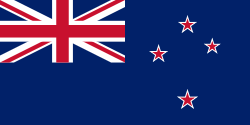| New Zealand at the 1934 British Empire Games | |
|---|---|
 | |
| CGF code | NZL |
| CGA | New Zealand Olympic and British Empire Games Association |
| Website | www |
| in London, England | |
| Competitors | 12 |
| Flag bearers | Opening: Jack Lovelock Closing: |
| Officials | 1 |
| Medals Ranked 6th |
|
| British Empire Games appearances | |
New Zealand at the 1934 British Empire Games was represented by a small team of 12 competitors and one official. Team selection for the Games in London, England, was the responsibility of the New Zealand Olympic and British Empire Games Association. New Zealand's flagbearer at the opening ceremony was Jack Lovelock.
Contents
- Medal tables
- Competitors
- Athletics
- Track
- Field
- Cycling
- Lawn bowls
- Swimming
- Officials
- See also
- External links
New Zealand has competed in every games, starting with the previous (and first) British Empire Games in 1930 at Hamilton, Ontario.
